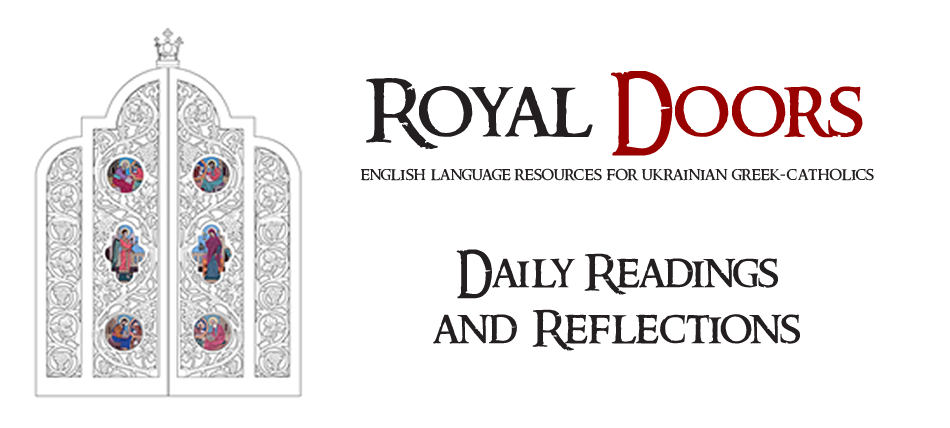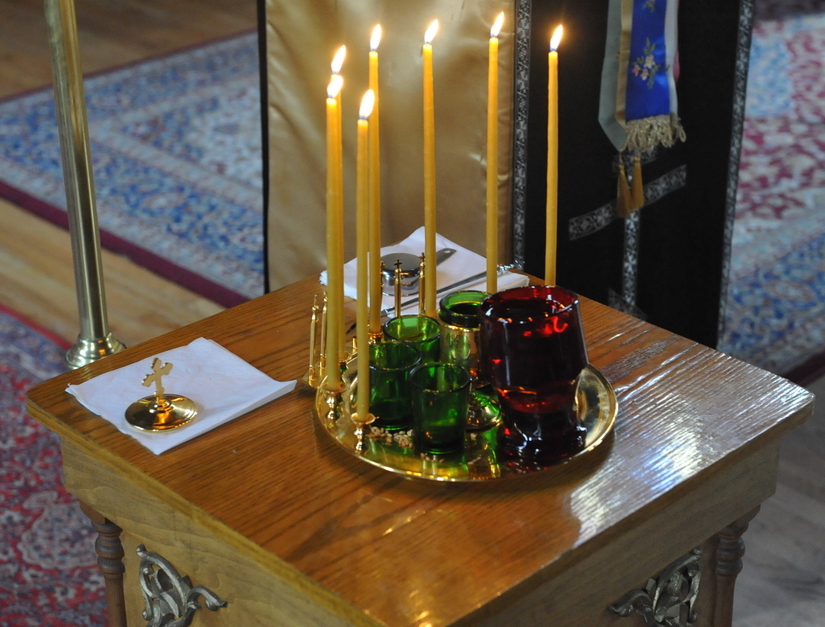During the forty days of the Great Fast the Church urges us to ascetic effort as a preparation for the observances of Holy Week and Pascha. We know that, by His death and resurrection, Christ has achieved the restoration of our human nature in Himself and has enabled us to share in His victory over sin and death by baptism.
Like Adam in the resurrection icon, Christ has taken us by the hand to draw us from the pit of spiritual death. But we know that, like Adam, our feet are still in the grave. It takes a lifelong process of ascetical effort to keep us joined to the redeeming hand of Christ and emerge from the tomb.
The seal on our Lenten striving is participation in the holy mysteries. Earlier in the Church’s life those who were repenting of serious sins were excluded from the Eucharist during the Fast and reconciled to the Church in Holy Week. The Armenian and Maronite Churches still observe the reconciliation of penitents during this week, celebrating in deed as well as word the forgiveness won by the death of Christ.
In the Byzantine Churches the sacramental climax of our Lenten asceticism is the Mystery of Holy Unction. Anointing the sick was practiced by the apostles during the lifetime of Christ (cf. Mark 6:13) and by the Church in the apostolic age (cf. James 5:14-15). There are occasional references to this mystery in some of the Fathers but the specific practice only reached its present form after the fourteenth century.
Conferring this mystery to the whole congregation seems to have come about in response to the plagues which struck Constantinople eleven times in the fourteenth century. Then the whole city – and ultimately much of Europe and Asia – seemed to be in danger of death. General anointing services were held to help all the people of the capital in these times of crisis.
The Church has always spoken of spiritual and physical sickness in the same breath. Our misplaced strivings for “life” (greed, lust, power, and the rest) have the opposite effect, doing damage to our bodies as well as our spirits. Thus prayers for healing often join intercession for spiritual as well as bodily health.
It should not strike us as odd that the mystery of Holy Unction replaced the reconciliation of penitents as the sacramental seal on the Great Fast. We may not be in need of reconciliation after committing serious sins, but our broken human nature is always in need of healing. Since the Wednesday of the Great Week includes the memorial of Christ’s anointing by Mary, the sister of Lazarus, in Bethany six days before the Passover (cf. John 12:1-8), it became the customary day for offering this mystery to those preparing for Pascha.
Confronting Our Infirmities
In the “Trisagion Prayers,” which occur in many of our services, we pray the following:
“All-holy Trinity, have mercy on us; Lord, forgive our sins; Master overlook our transgressions; Holy One, visit and heal our infirmities for Your name’s sake.”
In this prayer we affirm that we commit sins (deliberate rejections of what we know to be God’s way) and also transgressions (unrecognized or intended offenses). Many people say that if you didn’t mean it, then it’s not a sin. True, but does that then mean I am not responsible? The children whose ball breaks their neighbor’s window didn’t mean it, but the window is still broken; is no one responsible? The godly person accepts responsibility for transgressions as well as sins.
The prayer continues by requesting healing for infirmities, and it is here that the mystery of Holy Unction is important in our Christian life. Whenever we strive to deal with our passions, as during the Great Fast, we discover how unable we are to live God’s way by our own power. We need to throw ourselves at Christ’s feet and implore Him as did the blind man on the roadside, “Son of David, have mercy on me” (Matthew 9:27). It is with this disposition that receiving Holy Unction bears the most fruit.
Exploring the Service
In its fullest form, the Holy Unction service consists of two parts. The first is a kind of paraklisis or moleben in which we read psalms and sing troparia along with a canon and stikhera seeking God’s help:
“The whole earth is filled with Your mercy, O Master. Therefore we, who are anointed today with Your precious and divine oil, entreat You with faith that Your mercy beyond understanding be granted to us.” (from Ode One).
“With the tranquility of Your mercy, O Master, seal the senses of Your servants, making impassible and inaccessible the entrance of all adverse powers” (from Ode Four).
“Your seal is a sword against demons, O Savior, and the prayers of Your priests are fire burning the passions of the soul. Therefore we who are receiving healing faithfully sing Your praises” (from Ode Seven).
In the second part of the service oil is brought forth and, in some Churches, mixed with wine to recall the similar mixture used by the Good Samaritan in Christ’s parable (cf. Luke 10:25-37). The oil is blessed; then seven prayers are read, each with an epistle and Gospel. These prayers are offered by seven priests in succession, a reminder of the time when people would by anointed seven days in a row, each day by a different priest. In practice the service may be conducted with as few as one priest and one set of prayers and readings.
At the final prayer the assisting clergy hold the open Gospel book over the head of the people while the presiding priest prays, “I do not lay my sinful hand on the heads of those who come to You in sins, asking for the remission of sins through us, but Your mighty and powerful hand, which is in this, Your holy Gospel…Accept Your servants who are repenting of their sins, overlooking their transgressions.”
The priest then anoints the people on the forehead and hands (and sometimes on other parts of the body) saying, “Holy Father, Physician of souls and bodies, forgive, heal and save Your servant” or simply “For the healing of soul and body.”
A Communal Rite
From its beginnings in the apostolic Church, Holy Unction has always been a solemn and communal rite, rather than a private prayer, even when the recipient is seriously ill. Thus the Byzantine practice of having seven priests officiate hearkens back to St James’ injunction, “Is anyone among you sick? Let him call for the elders of the church, and let them pray over him, anointing him with oil in the name of the Lord. And the prayer of faith will save the sick, and the Lord will raise him up. And if he has committed sins, he will be forgiven” (James 5:14-15).
Even when a parish priest goes to anoint a sick parishioner he does well to take some of the un-ordained “elders” of the community along to offer their prayers and encouragement to their ill neighbor. In some parishes groups of people have been trained to accompany the priest on these occasions and to pray the mystery together, showing the sick that they are not alone in their time of trial and assuring them of the love of Christ at a most important time in their life.

